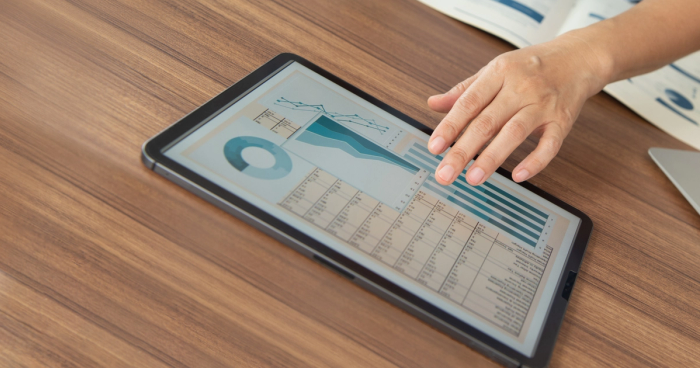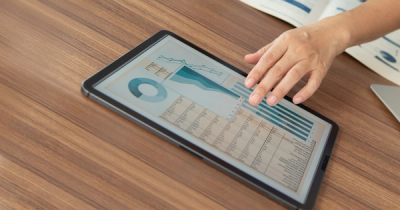Invoicing
The Rise of Mobile Invoicing: How It's Changing the Game for Small Businesses
If you've ever been bogged down by stacks of paperwork, delayed payments, or the headache of manual invoicing, you're not alone. Small business owners have been seeking a smarter, more efficient way to manage their finances. And that's where mobile invoicing steps in, offering a solution that's not only convenient but also incredibly effective.

If you've ever been bogged down by stacks of paperwork, delayed payments, or the headache of manual invoicing, you're not alone. Small business owners have been seeking a smarter, more efficient way to manage their finances. And that's where mobile invoicing steps in, offering a solution that's not only convenient but also incredibly effective.
In this article, we'll explore the rising trend of mobile invoicing, shedding light on its undeniable benefits for small businesses. From streamlining processes to enhancing accessibility and security, the world of invoicing is evolving, and you're about to discover why embracing this change could be the best decision you make for your business.
Understanding the Shift Toward Mobile Invoicing
The shift towards mobile invoicing is a significant marker in the evolution of modern business practices, mirroring the broader trend of businesses gravitating towards digital solutions and agility. This transition is far from a mere technological upgrade; it symbolizes a deeper change in the business landscape.
Small businesses, in particular, find themselves in a unique position where leveraging every available resource efficiently is not just an option, but a necessity for survival and growth. Mobile invoicing emerges as a response to this need, offering a blend of flexibility, efficiency, and accessibility that traditional invoicing methods struggle to match.
5 Benefits of Mobile Invoicing for Small Businesses
The adoption of mobile invoicing is a strategic decision that can yield significant advantages for small businesses. These benefits range from operational efficiencies to stronger client relationships, each contributing to the overall success and sustainability of the business. Here, we delve into these benefits to understand how they collectively transform the landscape of small business operations.
Increased Efficiency in Business Operations
Mobile invoicing dramatically streamlines the invoicing process. The ability to create, send, and manage invoices on the go means that business owners can issue invoices immediately after a job is completed, leading to quicker payment cycles. This immediacy eliminates the delays often associated with traditional invoicing methods, where paperwork might only be processed at the end of the day or week. Furthermore, the automation features in mobile invoicing apps reduce the time spent on repetitive tasks like data entry and calculations, allowing business owners to focus more on core business activities.
Enhanced Accessibility and Flexibility
With mobile invoicing, the restrictions of time and location are virtually eliminated. Business owners can manage their invoicing needs from anywhere, whether they're on-site, at a client's office, or working remotely. This flexibility is invaluable for those who are often in the field or travel frequently. Additionally, it offers the convenience of handling financial transactions outside of regular office hours, which can be a boon for managing urgent or unexpected billing scenarios.
Improved Cash Flow
One of the most tangible benefits of mobile invoicing is the positive impact it has on cash flow. By speeding up the invoicing process, payments can be received faster. Mobile invoicing also often includes options for online payments, which are quicker and more convenient for clients, thereby encouraging prompt payments. Better cash flow management is crucial for small businesses, as it enhances their ability to pay suppliers, invest in growth opportunities, and maintain operational stability.
Professionalism and Brand Enhancement
Mobile invoicing tools often come with customizable templates that allow businesses to include their branding elements such as logos, color schemes, and company information. This professional presentation can significantly enhance a company’s brand perception. A well-designed invoice reflects positively on the business, conveying a sense of professionalism and attention to detail. This is especially important for small businesses looking to establish credibility and build a strong market presence.
Eco-friendly and Cost-effective
Embracing mobile invoicing is a step towards environmentally friendly practices by reducing the need for paper-based transactions. This not only helps in conserving resources but also aligns with the growing consumer preference for eco-conscious businesses. Additionally, digital invoicing cuts down on costs related to printing, paper, and postage. For small businesses operating with tight budgets, these savings can be significant, allowing them to allocate resources more effectively toward other business growth areas.
The Impact of Mobile Invoicing on Small Businesses
Mobile invoicing is more than just a technological upgrade; it's a catalyst for fundamental changes in how small businesses handle their finances. By adopting this approach, businesses are seeing tangible improvements in several key areas.
Streamlining Invoicing Processes with Mobile Apps
Mobile apps dedicated to invoicing bring an unprecedented level of efficiency to the billing process. With these apps, invoices can be created, sent, and managed on the go, eliminating the need for paper-based systems and reducing the time spent on manual data entry. This not only speeds up the invoicing process but also enhances accuracy, as the likelihood of human error is significantly reduced.
Moreover, these apps often come with user-friendly interfaces, making it easier for business owners who may not be tech-savvy to navigate the digital invoicing landscape. The simplicity and intuitive design of many mobile invoicing apps mean that the transition from traditional methods is smooth and hassle-free.
Enhancing Accessibility and Convenience
One of the most significant advantages of mobile invoicing is the increased accessibility it provides. Business owners can generate, send, and manage invoices from anywhere, at any time, directly from their mobile devices. This level of convenience is particularly beneficial for businesses that operate on-the-go or have a remote workforce.
This mobility also extends to clients, who can receive, review, and respond to invoices more quickly and easily. This ease of interaction can lead to faster payment times and improved client satisfaction, as the overall billing experience becomes more streamlined and user-friendly.
Saving Time and Reducing Administrative Overhead
Adopting mobile invoicing can lead to substantial time savings and a reduction in administrative overheads. The automation of many invoicing tasks – such as calculating totals, tracking expenses, and following up on unpaid invoices – frees up valuable time that can be spent on other areas of the business.
These time savings also translate into cost savings. With less need for paper, printing, and postage, not to mention the reduced requirement for administrative staff to manage invoicing processes, small businesses can significantly cut down on operational costs.
Improving Cash Flow Management
Effective cash flow management is crucial for the survival and growth of any small business. Mobile invoicing can improve this by speeding up the payment process. With features like instant invoice delivery and easy online payment options, clients are more likely to make prompt payments.
Furthermore, many mobile invoicing apps provide real-time tracking of sent invoices and payments received. This feature allows small business owners to have a clear and current view of their financial position, enabling more informed decision-making regarding spending and investment.
Security and Privacy Concerns in Mobile Invoicing
While mobile invoicing offers numerous advantages, it also brings up questions regarding security and privacy – crucial aspects in the handling of financial data.
Addressing Security Risks in Mobile Transactions
In a world where digital transactions are commonplace, the security of mobile invoicing systems is paramount. Reputable mobile invoicing apps are equipped with robust security measures to protect against unauthorized access and data breaches. This includes encryption of data, secure login processes, and regular security updates.
Small business owners need to be proactive in understanding the security features of their chosen invoicing app. Ensuring that the app complies with industry-standard security protocols can provide peace of mind and safeguard the business and its clients from potential cyber threats.
Protecting Sensitive Financial Data
The responsibility of handling sensitive financial data is a significant aspect of mobile invoicing. To maintain the integrity and confidentiality of this data, mobile invoicing apps typically incorporate various privacy controls. This includes data encryption, access controls, and secure data storage.
Additionally, small business owners should be aware of the best practices for protecting financial data, such as regularly updating software, using strong passwords, and being cautious about network security, especially when using public Wi-Fi networks for financial transactions.
Compliance with Data Privacy Regulations
Compliance with data privacy laws and regulations is another critical consideration for mobile invoicing. This means ensuring that the invoicing app adheres to legal standards such as GDPR or other regional data protection regulations. Small business owners must choose an invoicing solution that is not only efficient but also compliant with these laws, to avoid legal complications and maintain trust with clients.
The Future of Mobile Invoicing for Small Businesses
As we look towards the future, it's clear that mobile invoicing will continue to evolve and shape the way small businesses operate.
Emerging Trends and Innovations
The field of mobile invoicing is continuously evolving, with new trends and innovations constantly emerging. This includes the integration of advanced technologies like AI and machine learning, which can further streamline the invoicing process and provide predictive insights into cash flow trends.
Another growing trend is the use of blockchain technology in mobile invoicing. This can offer enhanced security and transparency in transactions, paving the way for more trust and efficiency in business operations.
Integration with Accounting Software and Payment Gateways
One of the most significant future developments in mobile invoicing is its increasing integration with other business tools, such as accounting software and payment gateways. This integration allows for a more seamless flow of financial data across different platforms, reducing the need for manual data entry and minimizing errors.
Such integrations also mean that small businesses can manage their entire financial ecosystem from a single platform, enhancing efficiency and providing a more comprehensive view of their financial health.
Staying Ahead in a Mobile-First Business World
In a mobile-first world, staying ahead means embracing mobile invoicing as a core part of business operations. Small businesses that leverage this technology can expect to not only keep pace with current trends but also position themselves for future growth and success. By adopting mobile invoicing, small businesses can ensure they are not left behind in an increasingly digital and mobile-oriented marketplace.
Final Thoughts
As we conclude, it's clear that mobile invoicing is a powerful tool for small businesses, offering enhanced efficiency, security, and convenience. Cassie Invoice is here to help small businesses keep up with these changes. It offers tools that make invoicing and managing finances simpler, so businesses can focus on growing. With Cassie Invoice the future of invoicing looks promising, helping businesses stay competitive and efficient.
Mary Achurra
2024-04-15
Get the cheat sheet and checklist for free
The software tools evaluation checklist will help you choose the best solution for your business.
Latest articles
Get started for free today
Get 21 days free access to our platform and improve your business.





